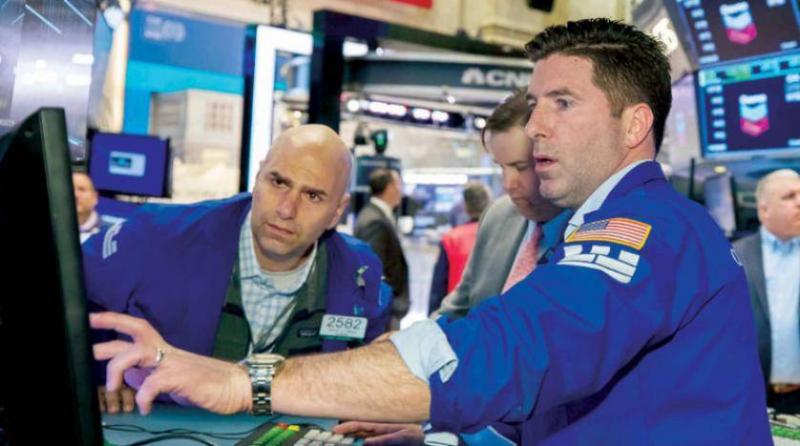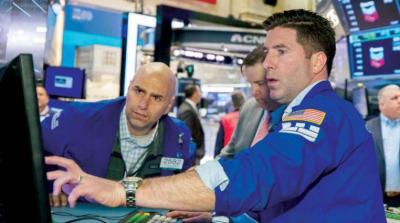The global economy, which has yet to recover from the COVID-19 pandemic crisis, is facing the repercussions of the looming war in Ukraine and the sharp rise in commodity prices, dispelling hopes that emerged at the beginning of the year.
Jakob Kirkegaard, a member of the German Marshall Fund research group in Brussels, notes that “the war erupted at a time when Europe and the United States were enjoying an excellent recovery.” According to the French press agency, European Central Bank President Christine Lagarde acknowledged that the Russian invasion of Ukraine, which began just two weeks ago, “significantly increases” the risks. The bank lowered its growth forecasts for the Eurozone in 2022 by 0.5 percentage points to 3.7 percent.
The International Monetary Fund also plans to lower its global forecasts. Furthermore, Standard & Poor's credit rating agency reduced its forecast by 0.7 points to 3.4 percent, due to the anticipated collapse of the Russian GDP and rising energy prices.
Jan-Pezani Ferry, an economist at the Bruegel Institute, estimates that the war will cost the European Union 175 billion euros due to the impact of energy bills, refugee reception, and financial support. However, there is no need to fear a major recession; Kirkegaard discusses the risk of stagflation, a phenomenon that occurs when weak growth coincides with high inflation rates, particularly alongside the renewed spread of the pandemic in China, which raises concerns. Kirkegaard states, “This uncertainty is as significant as the war itself.”
This inflation has persisted for a year. Initially linked to supply chain disruptions caused by the pandemic crisis, it now reflects the sharp rise in commodity prices, which burdens companies' production costs and households' purchasing power. Thomas Pellerin-Carlin, director of the Energy Center at the Jacques Delors Institute, states, “We are facing an oil shock, in addition to gas and electricity shocks. We have never seen such a synchronization before; this is only regarding energy.”
U.S. Federal Reserve Chairman Jerome Powell estimated this week, before the U.S. Congress, that every $10 increase in oil prices causes growth in the United States to decline by approximately 0.1 points and inflation to increase by 0.2 points, with the latter reaching 7.9 percent in February.
In addition to oil and gas, prices of many other economic elements such as aluminum, nickel, wheat, and corn are rising. Russian President Vladimir Putin himself warned on Thursday of inflation resulting from the sanctions imposed on his country. Most sectors are affected, from petroleum plastic production to electric battery manufacturing that requires nickel, as well as aircraft manufacturing, which relies on aluminum.
Manufacturing sites for iron and steel have halted operations, especially in Spain, due to an inability to pay electricity bills. Worldwide, transportation, food, and heating have become more expensive. In Egypt, Omar Azam, a 31-year-old resident of Cairo, states that “the price of bread has risen dramatically,” having increased by 50 percent since the Russian invasion of Ukraine.
Egypt is the world’s largest wheat importer and the second-largest importer from Russia. It has previously reduced the weight of subsidized bread and is now considering increasing its price. French President Emmanuel Macron warned during a European summit in Versailles that Europe and Africa “will be profoundly affected in terms of food” in the next 12 to 18 months, particularly due to the expected numerous disruptions during the harvesting season in Ukraine, especially for wheat.
For its part, the G7 nations urged the international community on Friday to avoid any measures that restrict food export operations. The phrase “Whatever it costs,” popularized by former European Central Bank President Mario Draghi, led to a historic budget in Europe in 2020, accompanied by joint debt.
The United States has adopted multiple enormous financial plans, and Japan approved a third plan in November. But in light of the deterioration of public financial situations, this time the assistance should be more directed towards helping the victims of inflation.
From the corporate perspective, Christophe Barrow, an economist at MarketSecurities, believes that investors do not expect major failures but rather just “slight tension.” In contrast, the most vulnerable emerging economies could witness a deterioration in their conditions, and sometimes even in their stability.




